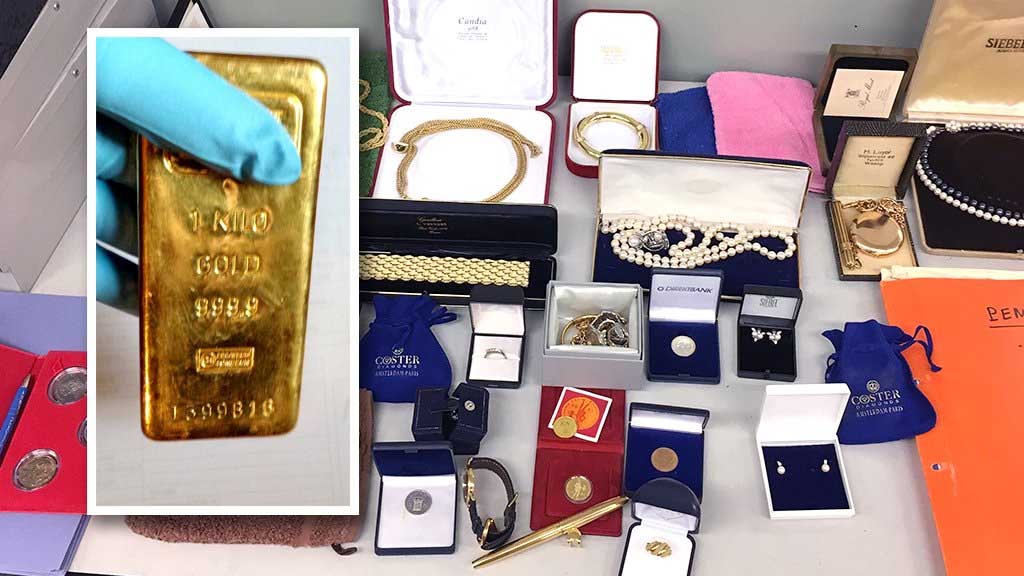Credit Suisse has confirmed that the Swiss bank, some of its employees and hundreds of account holders are the subjects of a major tax evasion probe launched in UK, France, Australia, Germany and the Netherlands, setting back Swiss attempts to clean up its image as a haven for tax evaders. According to Bloomberg, Dutch investigators seized jewellery, paintings and even gold bars as part of a sweeping investigation into tax evasion and money laundering in the Netherlands. They added that the sums involved amounted to “many millions” of lost tax revenue. Doorzoekingen tijdens internationale actiedag in verband met onderzoek naar #zwartsparen bij een #Zwitsersebank: https://t.co/dhymVvlyHr. pic.twitter.com/VRha4rlTHb — FIOD (@FIOD) March 31, 2017 Two individuals who were arrested on Thursday in connection with the raids were accused of concealing millions of euros from authorities by placing them, where else, in Swiss bank accounts, the Fiscal Information and Investigation Service said in a statement Friday. Criminal investigations are also underway in Australia, Germany, the U.K. and France. The Swiss bank also said Friday that its offices in London, Paris and Amsterdam were raided Thursday by authorities in connection with client tax matters. In a statement by the U.K. tax authority, it said it was investigating "senior employees" at a global financial institution.
Topics:
Tyler Durden considers the following as important: Australia, Bank secrecy, Banking, Banking in Switzerland, Business, Credit Suisse, economy, Finance, Financial services, Fiscal Information and Investigation Service, France, Germany, Investment banks, Netherlands, Privacy, Secrecy, Swiss Banks, Switzerland, Tax avoidance, Tax evasion, Tax Revenue, Twitter
This could be interesting, too:
Claudio Grass writes The Case Against Fordism
Fintechnews Switzerland writes Top 12 Fintech Courses and Certifications in Switzerland in 2025
Claudio Grass writes “Does The West Have Any Hope? What Can We All Do?”
Claudio Grass writes Predictions vs. Convictions
Credit Suisse has confirmed that the Swiss bank, some of its employees and hundreds of account holders are the subjects of a major tax evasion probe launched in UK, France, Australia, Germany and the Netherlands, setting back Swiss attempts to clean up its image as a haven for tax evaders.
According to Bloomberg, Dutch investigators seized jewellery, paintings and even gold bars as part of a sweeping investigation into tax evasion and money laundering in the Netherlands. They added that the sums involved amounted to “many millions” of lost tax revenue.
Doorzoekingen tijdens internationale actiedag in verband met onderzoek naar #zwartsparen bij een #Zwitsersebank: https://t.co/dhymVvlyHr. pic.twitter.com/VRha4rlTHb
— FIOD (@FIOD) March 31, 2017
Two individuals who were arrested on Thursday in connection with the raids were accused of concealing millions of euros from authorities by placing them, where else, in Swiss bank accounts, the Fiscal Information and Investigation Service said in a statement Friday. Criminal investigations are also underway in Australia, Germany, the U.K. and France.
The Swiss bank also said Friday that its offices in London, Paris and Amsterdam were raided Thursday by authorities in connection with client tax matters.
In a statement by the U.K. tax authority, it said it was investigating "senior employees" at a global financial institution. Australia’s Serious Financial Crime Taskforce said it had identified 346 of its citizens "with links to Swiss banking relationship managers alleged to have actively promoted and facilitated tax evasion schemes."
While Credit Suisse said it was cooperating with the authorities, the investigations threatened an international row, with the Swiss public prosecutor expressing “astonishment” at the actions taken by Dutch authorities. The raids were done without informing authorities in Switzerland, the attorney general’s office in that country said in a statement. The Swiss aren’t conducting a criminal probe into the matter, a spokeswoman said.
According to the FT, statements by authorities in the UK and Netherlands did not mention Credit Suisse by name but suggested the inquiries were widespread with the potential to expand further.
The bank said it has “implemented Dutch and French voluntary tax disclosure programs and exited non-compliant clients,” and has applied a withholding tax agreement with the U.K. since 2013.
The latest tax crackdown takes place years after the second largest Swiss bank was hopeful it had put its tax-evasive days in the past.
To be sure, Credit Suisse was hit hard in the past over tax evasion allegations, and was fined $2.6 billion in the U.S. in 2014 and pleaded guilty to helping Americans evade taxes. The bank paid a 150 million-euro fine in Germany in 2011 to end court proceedings over allegations it helped clients evade taxes.
“The sheer volume of data and its international scope makes this an exceptional case,” said Thierry Boitelle, a lawyer with Bonnard Lawson in Geneva.
As Bloomberg adds, the investigations come as Credit Suisse begins implementing a new global standard for the automated exchange of information for its European locations. About 100 countries, or jurisdictions, including Switzerland, have agreed to collect data from banks to share annually with other tax authorities, making it harder for tax dodgers and money launderers to hide money with private banks.
Meanwhile, the Dutch public prosecutor’s office confirmed that authorities had received information on 55,000 people with accounts at a Swiss bank, including 3,800 Dutch people, spokeswoman Marieke van der Molen said. In the Netherlands, there are "dozens of suspects," she said.
"The international reach of this investigation sends a clear message that there is no hiding place for those seeking to evade tax," the U.K. authority said in its statement.
What is most confusing about this latest scandal, however, is that years after Obama launched an unprecedented crackdown on Swiss banking secrecy, effectively ending it, tens of thousands of clients still entrusted Swiss banks with their untaxed savings without concerns of confiscation. The other confusing aspect of this whole affair, namely that Europeans still save money at a time of negative interest rates, we will leave to the philosophers to debate.

